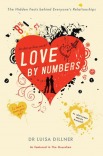
Of course such a broad description covers just about everyone, but Dillner's book has an originality. She is using scientific research that can answer questions such as:
- How do I know if he's the one?
- Are office romances doomed?
- What's the best way to mend a broken heart?
How can you use "scientific" tools to measure such unscientific subjects like love, longing, desire, grief, jealousy etc etc.
Here it is how, in front of our very eyes!
Let me first say that Dr Dillner did not conduct research herself. But she is a scientist, and she is a careful scientist at that; she has access to current literature and has the ability to search. So, without it being her main intention, she can help us by having already done all this searching for us.
Searching for what?
For example, searching for the answer to this question:
Is it true that women are more touchy in relationships?
(Touchy here used in the sense of tactile.)
Now, let's try to design an experiment that would provide an answer to this.
We would need, of course to have an honest depiction of what men and women do. But also we would need to make sure that we will not be confounded by factors such as how long has a couple been together etc. That is the best way? Administer questionnaires? Possibly.
But this is not what the authors of a study in the Journal of Social and Personal Relationships did. (I am quoting from Dr Dillner's book).
They started by "selecting 154 couples from cinema queues and observing how often they touched within a two-minute period. They then went up to the couples and asked them how long they'd been together. They found that there were no differences between how often men and women started touching their partner, and, as you might expect, longer-term couples were less likely to touch each other. But this didn't mean they weren't close. The longer-term couples rated themselves closer than other couples --they just didn't show as much attention to each other. Al least not when queuing."
To this, Dr Dillner adds wryly: "The researchers didn't follow them home."
Here I would feel inclined to say "I rest my case", and stop.
But I will add one more thing.
Such methodology is the norm whenever we have science studying an aspect of what it is to be human.
In order to be scientific, researchers slice human behaviour, delineate it, observe it, measure it, question it, and process it with SPSS, the ubiquitous statistical software package that all psychologists use.
And then they publish their results in prestigious journals, adding thus their little bit to what we call science.
Let us compare with psychoanalysis.
154 couples for two minutes , and their respective questionnaires.
vs
a person or a couple for sessions after sessions, exploring all aspects of what this means for them, to be intimate with another person, to be "touchy" or to be in a long-term relationship. No shortcuts, no easy solutions, no preconceived models in the form of questionnaires.
Now I can rest my case.
 RSS Feed
RSS Feed